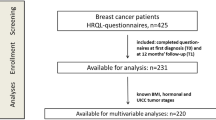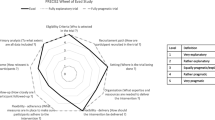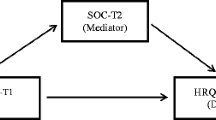Abstract
Purpose
In the breast cancer center at the Gemeinschaftskrankenhaus Havelhöhe (GKH), integrative strategies are implemented in the routine care of breast cancer patients. The aim of this breast cancer real-world study was to systematically evaluate changes in patients’ internal coherence and resilience, associated with the use of non-pharmacological interventions (NPIs).
Methods
This study included 231 primary breast cancer patients treated with standard oncological therapy and NPIs, which comprise art and movement therapies, nursing interventions, and educational components, and had answered the internal coherence scale (ICS) questionnaire at first diagnosis and 12 months later. Data were collected from the Network Oncology clinical registry of the GKH, and effects of NPIs on ICS changes were analyzed with adjusted linear multivariable regression analyses, using the software R.
Results
Two hundred twenty breast cancer patients of all tumor stages were eligible for a total of 27 separate adjusted multivariable linear regression analyses. The NPIs elaborate consultations and life review (ECLR); nursing compresses, music therapy, and rhythmic massages were significantly associated with increases of about 2-point changes in inner resilience and coherence (p < 0.05). Furthermore, a significant association with an elevation of the thermo coherence was observed for the application of nursing compresses.
Conclusions
The evaluation of real-world data carried out here shows that the application of the multimodal treatment concept can lead to an enhancement of the internal coherence and resilience in breast cancer patients. To improve the care of cancer patients, this multimodal program should be further expanded into routine clinical practices.
Trial registration
Trial registration number DRKS00013335 on 27/11/2017 retrospectively registered


Similar content being viewed by others
Availability of data and material
All data generated or analyzed during this study are included in this article.
References
Bray F, Ferlay J, Soerjomataram I, Siegel RL, Torre LA, Jemal A (2018) Global cancer statistics 2018: GLOBOCAN estimates of incidence and mortality worldwide for 36 cancers in 185 countries. CA Cancer J Clin 68(6):394–424. https://doi.org/10.3322/caac.21492
Montazeri A (2008) Health-related quality of life in breast cancer patients: a bibliographic review of the literature from 1974 to 2007. J Exp Clin Cancer Res 27:32. https://doi.org/10.1186/1756-9966-27-32
Greenlee H, DuPont-Reyes MJ, Balneaves LG, Carlson LE, Cohen MR, Deng G, Johnson JA, Mumber M, Seely D, Zick SM, Boyce LM, Tripathy D (2017) Clinical practice guidelines on the evidence-based use of integrative therapies during and after breast cancer treatment. CA Cancer J Clin 67(3):194–232. https://doi.org/10.3322/caac.21397
Schad F, Thronicke A, Merkle A, Steele ML, Kroz M, Herbstreit C, Matthes H (2018) Implementation of an integrative oncological concept in the daily care of a German certified breast cancer center. Complement Med Res 25(2):85–91. https://doi.org/10.1159/000478655
Thronicke A, Oei SL, Merkle A, Herbstreit C, Lemmens HP, Grah C, Kroz M, Matthes H, Schad F (2018) Integrative cancer care in a certified cancer centre of a German anthroposophic hospital. Complement Ther Med 40:151–157. https://doi.org/10.1016/j.ctim.2018.03.012
Kienle GS, Albonico HU, Baars E, Hamre HJ, Zimmermann P, Kiene H (2013) Anthroposophic medicine: an integrative medical system originating in europe. Glob Adv Health Med 2(6):20–31. https://doi.org/10.7453/gahmj.2012.087
Kienle GS, Mussler M, Fuchs D, Kiene H (2016) Individualized integrative cancer care in anthroposophic medicine: a qualitative study of the concepts and procedures of expert doctors. Integr Cancer Ther 15(4):478–494. https://doi.org/10.1177/1534735416640091
Thronicke A, Kroz M, Merkle A, Matthes H, Herbstreit C, Schad F (2018) Psychosocial, cognitive, and physical impact of elaborate consultations and life review in female patients with non-metastasized breast cancer. Complement Med Res 25(2):92–101. https://doi.org/10.1159/000486672
Antonovsky A (1993) The structure and properties of the sense of coherence scale. Soc Sci Med (1982) 36(6):725–733
Kroz M, Bussing A, von Laue HB, Reif M, Feder G, Schad F, Girke M, Matthes H (2009) Reliability and validity of a new scale on internal coherence (ICS) of cancer patients. Health Qual Life Outcomes 7:59. https://doi.org/10.1186/1477-7525-7-59
Eriksson M, Lindstrom B (2007) Antonovsky's sense of coherence scale and its relation with quality of life: a systematic review. J Epidemiol Community Health 61(11):938–944. https://doi.org/10.1136/jech.2006.056028
Kroz M, Reif M, Bussing A, Zerm R, Feder G, Bockelbrink A, von Laue HB, Matthes HH, Willich SN, Girke M (2011) Does self-regulation and autonomic regulation have an influence on survival in breast and colon carcinoma patients? Results of a prospective outcome study. Health Qual Life Outcomes 9:85. https://doi.org/10.1186/1477-7525-9-85
Surtees P, Wainwright N, Luben R, Khaw KT, Day N (2003) Sense of coherence and mortality in men and women in the EPIC-Norfolk United Kingdom prospective cohort study. Am J Epidemiol 158(12):1202–1209
Kokolus KM, Hong CC, Repasky EA (2010) Feeling too hot or cold after breast cancer: is it just a nuisance or a potentially important prognostic factor? Int J Hyperth 26(7):662–680. https://doi.org/10.3109/02656736.2010.507235
Kröz M, Reif M, Zerm R, Schad F, von Laue BH, Storch T, Brinkhaus B, Willich SN, Girke M (2013) Mistletoe and chemotherapy responsiveness of different scales of oncological patients undergoing chemotherapy. In: Die Mistel in der Tumortherapie KVC Verlag, Germany, Scheer et al. (Hrsg), vol 3. Pp 417-437
Oei SL, Thronicke A, Kröz M, Herbstreit C, Schad F (2018) The internal coherence of breast cancer patients is associated with the decision-making for chemotherapy and Viscum album L. treatment. Evid Based Complement Alternat Med : eCAM 2018:1065271. https://doi.org/10.1155/2018/1065271
Oei SL, Thronicke A, Kröz M, Herbstreit C, Schad F (2019) Supportive effect of Viscum album L. extracts on the sense of coherence in non-metastasized breast cancer patients. Eur J Integr Med 27:97–104
Oei SL, Thronicke A, Kröz M, von Trott P, Schad F, Matthes H (2020) Impact of oncological therapy and Viscum album L treatment on cancer-related fatigue and internal coherence in nonmetastasized breast cancer patients. Integr Cancer Ther 19:1534735420917211. https://doi.org/10.1177/1534735420917211
Schiel R, Kaps A, Stein G, Steveling A (2016) Identification of predictors for weight reduction in children and adolescents with overweight and obesity (IDA-Insel survey). Healthcare (Basel, Switzerland) 4(1). https://doi.org/10.3390/healthcare4010005
Schad F, Axtner J, Happe A, Breitkreuz T, Paxino C, Gutsch J, Matthes B, Debus M, Kroz M, Spahn G, Riess H, von Laue HB, Matthes H (2013) Network oncology (NO)--a clinical cancer register for health services research and the evaluation of integrative therapeutic interventions in anthroposophic medicine. Forschende Komplementarmedizin 20(5):353–360. https://doi.org/10.1159/000356204
Team RC (2016) R: A language and environment for statistical computing. R Foundation for Statistical Computing, Vienna
Boehm K, Cramer H, Staroszynski T, Ostermann T (2014) Arts therapies for anxiety, depression, and quality of life in breast cancer patients: a systematic review and meta-analysis. Evid Based Complement Alternat Med 2014:103297–103299. https://doi.org/10.1155/2014/103297
Wood MJ, Molassiotis A, Payne S (2011) What research evidence is there for the use of art therapy in the management of symptoms in adults with cancer? A systematic review. Psycho-oncology 20(2):135–145. https://doi.org/10.1002/pon.1722
Faller H, Schuler M, Richard M, Heckl U, Weis J, Kuffner R (2013) Effects of psycho-oncologic interventions on emotional distress and quality of life in adult patients with cancer: systematic review and meta-analysis. J Clin Oncol 31(6):782–793. https://doi.org/10.1200/jco.2011.40.8922
Peterson LL, Ligibel JA (2018) Physical activity and breast Cancer: an opportunity to improve outcomes. Curr Oncol Rep 20(7):50. https://doi.org/10.1007/s11912-018-0702-1
Van Dijck S, Nelissen P, Verbelen H, Tjalma W, Gebruers N (2016) The effects of physical self-management on quality of life in breast cancer patients: a systematic review. Breast (Edinburgh, Scotland) 28:20-28. doi:https://doi.org/10.1016/j.breast.2016.04.010
Tatrow K, Montgomery GH (2006) Cognitive behavioral therapy techniques for distress and pain in breast cancer patients: a meta-analysis. J Behav Med 29(1):17–27. https://doi.org/10.1007/s10865-005-9036-1
Ganz PA, Rowland JH, Desmond K, Meyerowitz BE, Wyatt GE (1998) Life after breast cancer: understanding women’s health-related quality of life and sexual functioning. J Clin Oncol 16(2):501–514. https://doi.org/10.1200/jco.1998.16.2.501
Mortimer JE, Flatt SW, Parker BA, Gold EB, Wasserman L, Natarajan L, Pierce JP (2008) Tamoxifen, hot flashes and recurrence in breast cancer. Breast Cancer Res Treat 108(3):421–426. https://doi.org/10.1007/s10549-007-9612-x
Frank SM, Raja SN, Bulcao CF, Goldstein DS (1999) Relative contribution of core and cutaneous temperatures to thermal comfort and autonomic responses in humans. J Appl Physiol (Bethesda, Md : 1985) 86(5):1588–1593. https://doi.org/10.1152/jappl.1999.86.5.1588
Nagashima Y, Oda H, Igaki M, Suzuki M, Suzuki A, Yada Y, Tsuchiya S, Suzuki T, Ohishi S (2006) Application of heat- and steam-generating sheets to the lumbar or abdominal region affects autonomic nerve activity. Auton Neurosci 126-127:68–71. https://doi.org/10.1016/j.autneu.2006.02.002
Moore J, Weinberg M (1975) The case of the warm moist compress. Can Nurse 71(3):19–21
Huber R, Weisser S, Luedtke R (2007) Effects of abdominal hot compresses on indocyanine green elimination--a randomized cross over study in healthy subjects. BMC Gastroenterol 7:27. https://doi.org/10.1186/1471-230x-7-27
Lemmer B, Nold G (1991) Circadian changes in estimated hepatic blood flow in healthy subjects. Br J Clin Pharmacol 32(5):627–629. https://doi.org/10.1111/j.1365-2125.1991.tb03964.x
Nagashima Y, Igaki M, Suzuki A, Tsuchiya S, Yamazaki Y, Hishinuma M, Oh-Ishi S, Majima M (2011) Application of a heat- and steam-generating sheet increases peripheral blood flow and induces parasympathetic predominance. Evid Based Complement Alternat Med 2011:965095–965013. https://doi.org/10.1155/2011/965095
Boivin DB, Czeisler CA, Dijk DJ, Duffy JF, Folkard S, Minors DS, Totterdell P, Waterhouse JM (1997) Complex interaction of the sleep-wake cycle and circadian phase modulates mood in healthy subjects. Arch Gen Psychiatry 54(2):145–152. https://doi.org/10.1001/archpsyc.1997.01830140055010
Teraoka S, Hayashida N, Shinkawa T, Taira Y, Nagai-Sekitani Y, Irie S, Kamasaki T, Nakashima-Hashiguchi K, Yoshida K, Orita M, Morishita M, Clancey G, Takamura N (2013) Good stress management capability is associated with lower body mass index and restful sleep in the elderly. Tohoku J Exp Med 229(1):5–10. https://doi.org/10.1620/tjem.229.5
Acknowledgments
We would like to thank all medical documentation officers at the GKH and the FIH involved in the present work.
Funding
The Network Oncology was partially funded by Iscador AG Arlesheim, Switzerland, Abnoba GmbH Pforzheim, Germany, and Helixor Heilmittel GmbH Rosenfels, Germany. By contract, researchers were independent from the funder.
Author information
Authors and Affiliations
Contributions
All authors contributed to the study conception and design. Data collection and analysis were performed by Shiao Li Oei and Anja Thronicke. The first draft of the manuscript was written by Shiao Li Oei, and all authors commented on previous versions of the manuscript and read and approved the final manuscript.
Corresponding author
Ethics declarations
Conflict of interest
HM is a member of the board of directors of Weleda AG and a member of the Network Arbeitsgemeinschaft der Wissenschaftlichen Fachgesellschaften (AWMF e.V.) guideline committee for integrative oncology (Guideline for Complementary Medicine in the Treatment of Oncological Patients). HM has an endowed professorship at the Charité Universitätsmedizin Berlin, which is financed by the Software AG Foundation, outside the submitted work. FS reports grants from Helixor Heilmittel GmbH (travel costs and honoraria for speaking), grants from AstraZeneca (travel costs and honoraria for speaking), grants from Abnoba GmbH, and grants from Iscador AG, outside the submitted work. The other authors have declared that no competing interests exist. No payment was received for any other aspects of the submitted work. There are no patents, products in development or marketed products to declare. There are no other relationships/conditions/circumstances that present a potential conflict of interest.
Ethics approval
The study complies with the principles laid down in the Declaration of Helsinki. The Network Oncology (NO) study has been approved by the ethics committee of the Medical Association Berlin (Berlin–Ethik-Kommission der Ärztekammer Berlin). The reference number is Eth-27/10. This study had been retrospectively registered at the WHO approved register German Register for Clinical Trials (Deutsches Register Klinischer Studien, DRKS), trial registration number DRKS00013335 on 27/11/2017.
Consent to participate
Written informed consent has been obtained from all patients prior to study enrollment.
Consent for publication
Not applicable
Additional information
Publisher’s note
Springer Nature remains neutral with regard to jurisdictional claims in published maps and institutional affiliations.
Electronic supplementary material
ESM 1
(PDF 82 kb)
Rights and permissions
About this article
Cite this article
Oei, S.L., Thronicke, A., Matthes, H. et al. Evaluation of the effects of integrative non-pharmacological interventions on the internal coherence and resilience of breast cancer patients. Support Care Cancer 29, 1413–1421 (2021). https://doi.org/10.1007/s00520-020-05617-4
Received:
Accepted:
Published:
Issue Date:
DOI: https://doi.org/10.1007/s00520-020-05617-4




